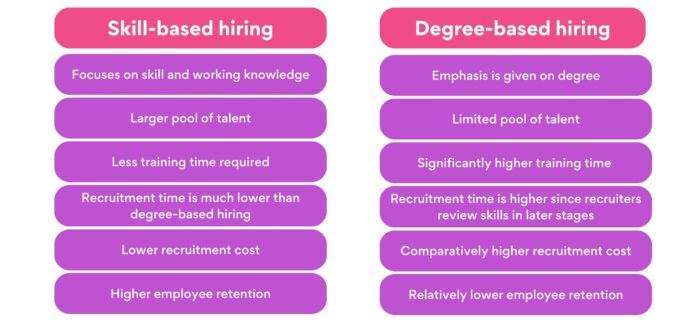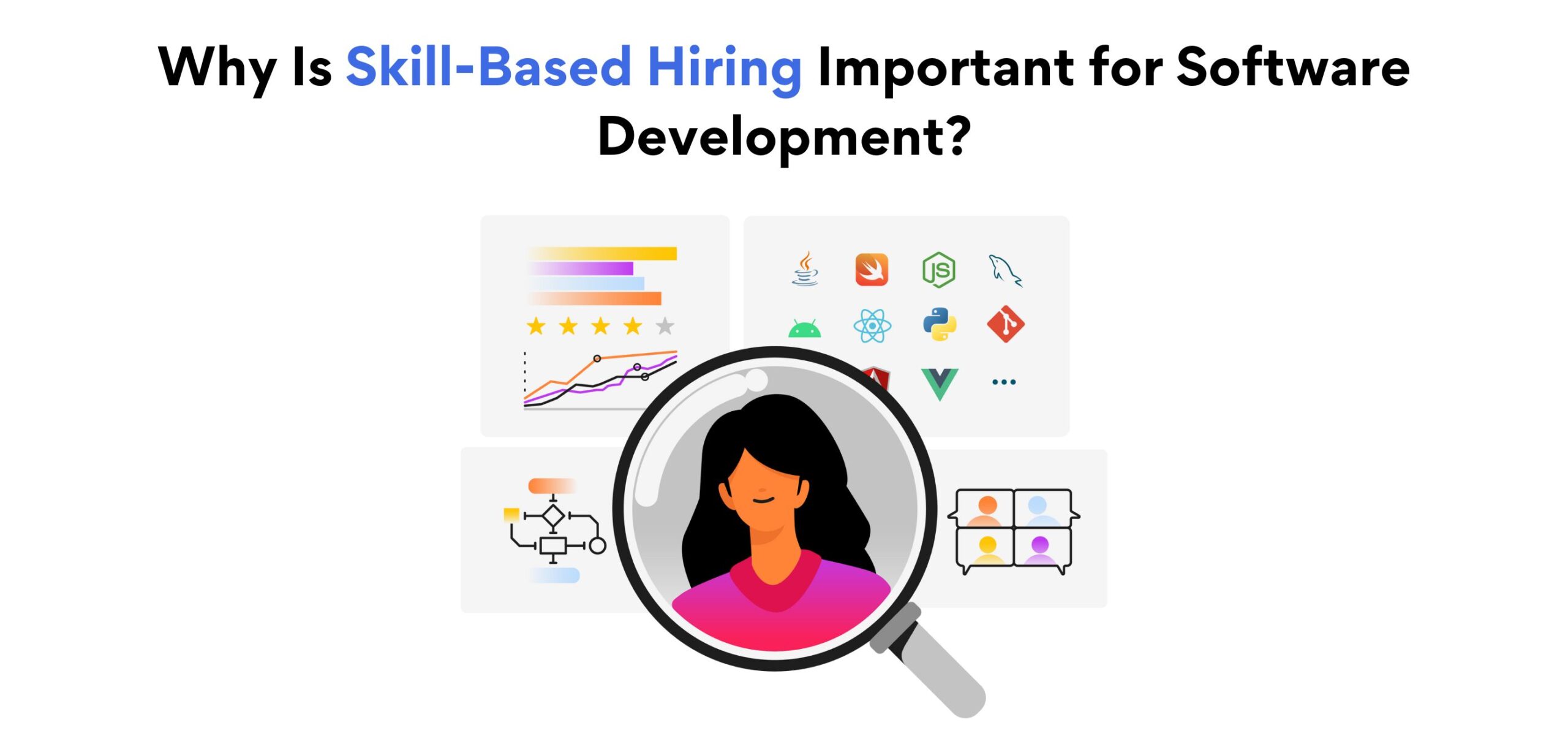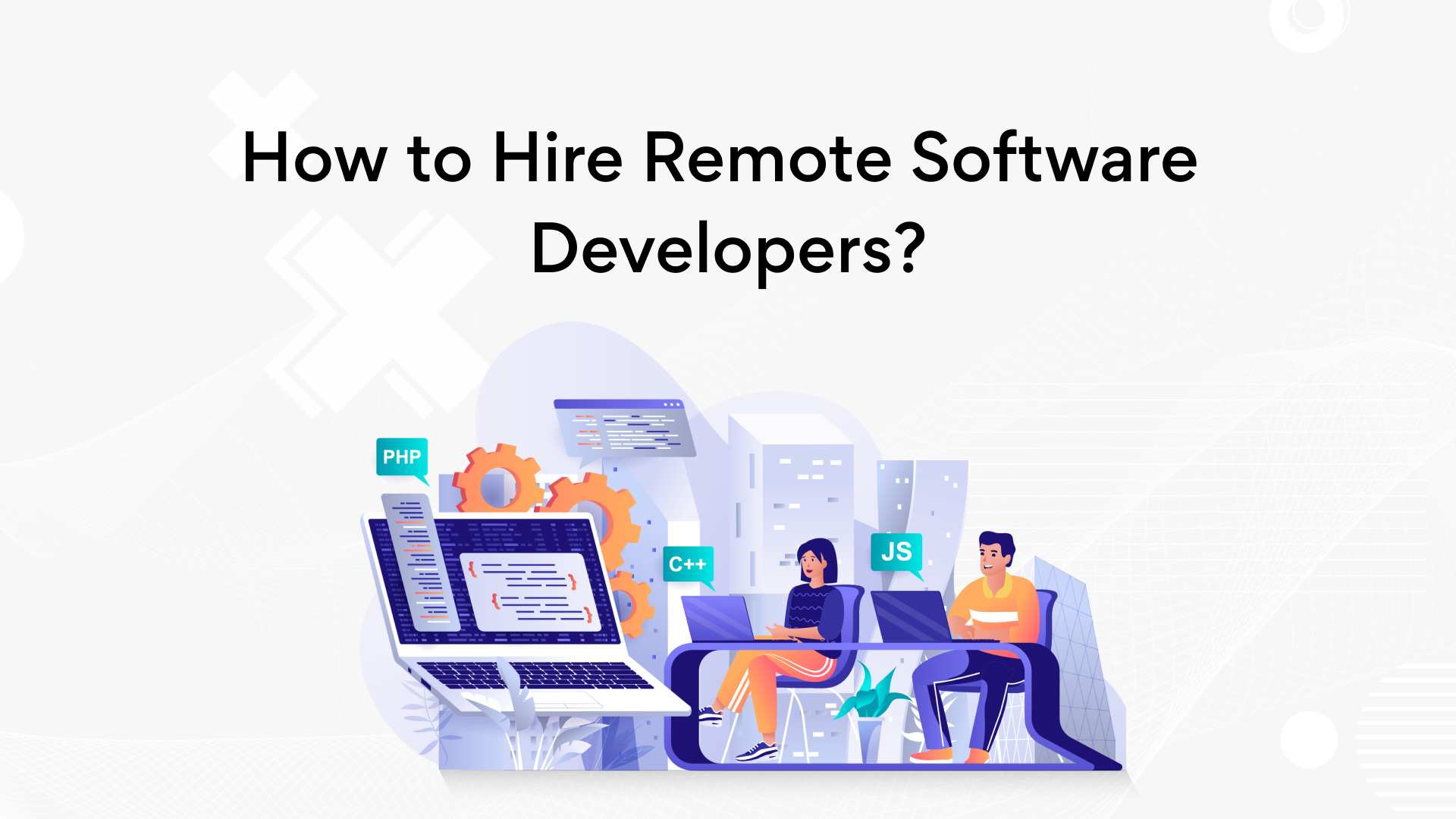Why is Skill-based Hiring Important for Software Development?
What is the most important thing required to perform a particular task? It’s the skill to do the job, isn’t it? Skill-based hiring helps you choose the most suitable candidate for the job. As a result, many organizations are adopting this approach to hire the best talent. The time for conventional hiring methods like looking at the college and degree is over. Today, if you want o hire top talent, you must focus on skills.
A CNBC report reveals Google, Apple, and many other tech companies don’t look for a college degree while hiring. They believe in hiring developers based on their abilities rather than their educational qualification. In addition, a Harvard Business Review found only 43 percent of the IT job postings by Accenture contained a degree requirement. Hiring software developers based on their skills is emerging to be the best way to build your development team. This blog post will discuss the importance of skill-based hiring in tech and how you can go about it. Let’s get started!
What is skill-based hiring?
As the name suggests, skill-based hiring is screening applicants based on their skills rather than their college degrees. These skills could be cognitive, physical, technical, or soft, based on the job requirements. The main purpose of this hiring method is to ensure the candidate has the skills needed to perform the assigned tasks.
When hiring a developer, adopting the skill-based hiring approach means selecting them based on their skill and not rejecting them because they don’t have a college degree.
The best way to implement skill-based hiring in tech recruitment is to evaluate their programming and soft skills through a skill assessment. This helps recruiters choose candidates with the core expertise for the job and overcome hiring challenges like skill gaps in the traditional process. Moreover, hiring employees with the right skills reduces training time, ensures better productivity, and improves retention.
Skill-based hiring vs degree-based hiring in tech recruitment
By now, you have got some idea of skill-based vs. degree-based hiring; however, let’s dive more into this topic. Skill-based hiring focuses on the candidate’s abilities, whereas degree-based hiring emphasizes certificates. In a degree-based hiring process, recruiters look at the resumes and shortlist those that look the most convincing in terms of education and degrees.
Look at the table below to better understand the key differences between the two.

Skill-based hiring vs degree-based hiring
Did you know? A Statista report shows JavaScript is the most used programming language among developers as of 2022. However, many universities don’t teach the language in their computer science programs.
If you follow degree-based hiring, you may end up hiring developers who are not skilled in JavaScript. On the other hand, if you focus on skill-based hiring, you will focus on the developers’ prowess in JavaScript and look at their past work instead of their college degrees and pick the best candidate accordingly. And thus, this approach helps you avoid mistakes while hiring software developers.
What are the advantages of skill-based hiring?
Tech giants like Apple, Google, IBM, and others have adopted skill-based recruitment because it enables them to hire high-quality developers and lower recruiting costs. But it’s not just the big techs. Many companies—big and small, have switched to skill-based hiring across the globe. Let’s understand why.
-
Helps you assess a candidate’s true potential before hiring
Evaluating a candidate’s skill is critical for hiring tech professionals. Skill assessments help you test a developer’s true potential to perform the responsibilities mentioned in the job description. With skill-based hiring, you can test a developer’s expertise in different tech stacks, like programming languages, frameworks, and soft skills.
Moreover, every company has different requirements, and hiring someone based on their resume is not a great way to make a hiring decision. The skill-based hiring approach allows you to hire developers based on the job requirements rather than their degrees. -
Grants access to a large talent pool
Software development is a skill-based job, and anyone can acquire the skill without getting a college degree. A StackOverflow survey found that 56 percent of developers didn’t have a formal computer science degree, 69 percent of respondents were at least partially self-taught, and 13 percent were entirely self-taught.
If you stick to hiring developers only with a college degree, you will miss out on a large talent pool. On the other hand, when you give preference to skill, you will attract more talent and increase your chances of finding the right fit for your company. -
Brings in a more data-backed and equitable recruitment approach
Several factors, including skillset, culturally fit, and individual values, determine a developer’s performance. Skill-based hiring requires hiring managers to use talent-matching tools and tactics to find the right candidate for an open position.
These techniques are based on verified skills and data points that enable you to focus more on the technical and soft skills required for the job. Moreover, this recruitment approach significantly reduces hiring bias and gives every candidate an equal opportunity to land a job. It also removes the chances of hiring someone who obtained a fake degree using dubious methods.
Also, read: 5 Tips to Become A Great Technical Hiring Manager -
Reduces time and cost of hiring
Conventional hiring involves reviewing hundreds of resumes first and shortlisting candidates based on their degrees and the percentage they scored in their exams. You will often find candidates with fancy degrees who don’t have the right skillsets for the job. This not only makes the hiring process longer but also increases the hiring cost due to adding additional human resources.
Skill-based hiring significantly reduces the hiring time, as it eliminates the candidates who lack the essential skills for the job. It ultimately reduces the recruitment cost. Moreover, when you hire developers based on their skills, you can save training costs, and they can work sooner. -
Promote diversity and build an excellent company culture
Diversity in the workplace is important in building a successful and thriving company. Skill-based hiring promotes diversity and gives you access to a larger talent pool. What’s more, diversity hiring helps your company get an edge over those who confine their recruitment within a particular geography or ethnicity.
Additionally, by emphasizing skills over college degrees, you can encourage applications from talented candidates who did not get a chance to earn a degree, thus creating a diverse workforce. -
Drive business growth
The success of a company significantly depends on its workforce. So, hiring suitable candidates is critical for every business, especially when hiring developers. You must be aware of the Eminent figures in technology industries like Steve Jobs, Bill Gates, and Mark Zuckerberg – all of them are college dropouts, but they went on to create thriving tech companies.
Candidates with the right technical and soft skills aligned with your business objectives will be valuable assets to your company and drive business growth whether they have the degree. -
Increases employee retention
Skill-based hiring means candidates join jobs that fit their skill sets. Such employees are more motivated and enjoy the opportunity to showcase their expertise. What’s more, they tend to work longer than those who join the job but don’t enjoy it due to a lack of skills. According to LinkedIn data, employees without a traditional college degree stay in jobs 34 percent longer than those with a degree.
Five steps to implement skill-based hiring in tech recruitment
-
Understand your business requirements
Understanding your project requirements is the first step toward implementing skill-based hiring. The more clarity you have about your requirement, the better your chances of finding the right developers. For example, skilled front-end developers can build a website’s user interface, identify issues with the front end, and provide solutions to influence the design.
They can also build a static website that is used to provide some information to the users. A front-end developer needs to be well-versed in technologies like HTML, CSS, JavaScript, Angular, React, jQuery, Ember, and others.
On the other end, backend developers build and maintain the mechanisms to process data and perform actions on a website or application. They enable the server, application, and database to interact. Backend developers must have expertise in programming languages like JavaScript, Java C#, Python, PHP, Ruby, and others. -
Write a clear job description
Once you know your requirements clearly, you know which skills to look for in the candidates. The next step is to write a good job posting with a clear job description that mentions the skills you are looking for and the developer’s day-to-day responsibilities.
You can also mention the KPIs you expect the developer to meet in a month or quarter. This practice gives candidates more clarity on what is expected of them. -
Create the right recruitment funnel
A recruitment funnel is a framework that helps you track every stage of hiring and improve the overall process. From attracting suitable candidates to hire, the funnel streamlines your hiring process and narrows down the candidate pool till you select one. When you implement skill-based hiring, your hiring funnel looks different than the traditional hiring process. It should include the following stages from the top.- Attract candidates toward the job opportunity
- Making sure the job seekers applying for the jobs
- Assessing their technical skills
- Shortlisting candidates based on the skill assessment
- Interviewing the candidates to find the best fit for the job
- Making the offer and completing the hiring process
Also, read: 10 Tips for Onboarding Remote Software Developers
-
Use an AI-powered hiring tool
Modern AI-powered hiring tools have transformed the hiring process. From applicant sourcing to finding employees with the right skills, these tools make the skill-based recruitment process easier and faster. You can customize your requirements according to the job demand. -
Focus on skills at every stage of the recruitment process
As the name denotes, skill is one of the most important factors to consider in skill-based hiring. It is even more crucial when hiring developers. From conducting skill assessments to shortlisting candidates, you should focus on testing the relevant skills.
Design your technical interview questions around skills and job requirements, and avoid emphasizing degrees. Besides, identify the candidate’s personality traits to find employees who fit naturally into your organization.
So, what should you keep in mind while implementing skill-based hiring?
The most important thing to consider while selecting developers is the skills they bring to the table. Do they have programming, problem-solving, and soft skills essential for your business? Are they culturally fit and have the right mindset? These things are more important than looking at the candidates’ degrees or educational qualifications.
Adopting skill-based hiring allows you to find developers with the right skills, irrespective of their educational background. However, conducting skill assessments for a large number of applicants takes a lot of work.
But Turing can help you with that.
Turing helps you to hire developers purely based on skills within four days. Our AI-powered vetting process uses 20,000+ ML signals to ensure you find the most suitable talent for your business. Once you share your requirements, we will match the right developer according to your need. Moreover, you get a free two-week trial period to evaluate the developer’s performance before signing a long-term contract.
Tell us the skills you need and we'll find the best developer for you in days, not weeks.












